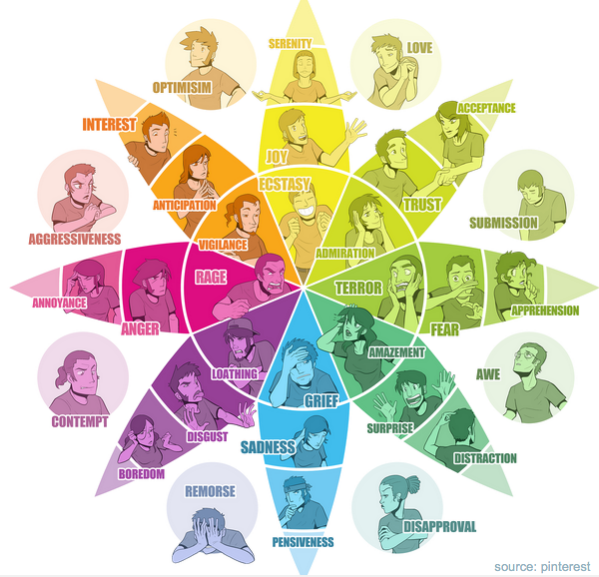It happens to everyone - temporarily losing energy or interest in a job. There are a host of variables effecting job satisfaction. Sometimes they get out of whack. Really naming what the issue is, how it's impacting you are essential. From there you can find ways to alter or change. Life's too short to wait!
How you think about work is influenced by so many variables.
If you are lucky enough never to feel uninterested or fried….that is fantastic. For the rest of us there are moments, days and in some cases stretches of time where it doesn’t feel right.
It’s ok to acknowledge the “meh” feeling to yourself. In fact not doing so can lead to an unhealthy reality.
Pushing in and through it leads to reflection and questioning. Most importantly, it makes room for a constructive way forward.
Consider, if you were trying to figure out how to help someone else in a similar place. You would think through the underlying causes, how that translates into their headset (“emotions”) and then short and near-term options.
Give yourself the same treatment you would provide for others!
(If you are short on time, here is a printable PDF of this post, click here.)

Your Busy Seems Good, Mine…
I was in line the other day at a deli. A number of us had ordered. We were waiting near the register for our orders to arrive so that we could check out. A woman was standing next to me. She dressed like she worked in an office and was out picking up lunch. She did not look or act happy in her interactions with anyone.
Her order finally was ready, and the cashier checking her out said energetically, “it’s nice to see you.” Her reply (loudly enough for the rest of us to take in) was unenthusiastically:
“You always look so busy. Your busy seems good though, mine is excruciating.”
That’s a tough one to respond to as evidenced by literally everyone in the deli looking left and right for someone else answer. No one did.
I couldn’t help but wonder about her struggles. Is it the work and the environment or something more personal and “real-life”?
I also couldn’t help but think; no one should work at or somewhere feeling like that. I’m sure this despair comes through in her work.
What You Think About Work Won’t Always Be Good
I’m not suggesting every minute of the day needs to be fun and inspiring. Every single job has tasks or responsibilities you will like more or less. You will work with people you like and don’t like. There are times when you will feel supported, other times not. Some days will feel like a grind.
It’s going to happen given the dynamic nature of the business world and personal lives.
This is about when it starts chipping away at you. When you genuinely aren’t doing your best work for one or more reasons.
It’s time for a pause on why.
When You Don’t Feel Like It
So there are a whole host of reasons why you can reach the point of – I don’t feel like it anymore. None of these are excuses or hall passes for not doing the work in a given day. Being a grown-up means, you do the job. At the same time, it’s about being in touch with what’s nagging at you.
Here is a sampling of what you might think about work – you (are/have):
- Waiting on something – a new role, money – something you expect to hear back on.
- Dealing with (more) change – you are navigating change on top of change.
- Been at the same thing too long – you have been doing the same role, maybe even the same way for a long time
- Not challenged or learning – the work isn’t challenging you. You have stopped learning.
- Work for someone you don’t like – you work for someone you don’t like or trust.
- Don’t like the work – you no longer enjoy the work, or the job has changed to something you don’t like.
- Work with people you don’t like – you are working with people you no longer like or respect.
- Have limited flexibility – lack of flexibility in your work arrangement is irritating.
- Feel like the work that’s lost its luster – you used to be inspired by the job; that feeling has worn off.
- Don’t like where you work – for a combination of factors you don’t like where you work.
- More work/expectations than possible – you can’t get done what’s expected.
- A commute that’s a killer – enough said.
- Spending too much time away – the travel or long days result in too much time away from critical people in your life.
There is a set of emotions present with each of these scenarios. It’s helpful to understand what sits below the surface.
Plutchik’s Wheel
Huh?
So Professor Robert Plutchik studied the science of emotions. He puts forth what’s known as the Wheel Of Emotions to help explain and understand emotions, their complexity and how they relate to each other.
There is a great deal you could read on the topic. Here are a few basics:
- There are a small number of basic primary emotions. They are:
- Joy, trust, fear, surprise, sadness, anticipation, anger, and disgust
- All other feelings are some mix or combination of the basic emotions.
- An example of a combination: disgust + anticipation = cynicism
- Emotions play an important role; they help people deal with and develop responses to opportunities and issues in their environment.
- An example of a combination and a response: trust + surprise = curiosity. The response to curiosity would be some investigation or exploration.
Identifying our emotions helps us to deal with and determine what response makes sense.
Inside Out – The Movie
The animated film Inside Out is one of Pixar’s most successful (and educational) original films. Like so many of their films, they are entertaining and instructive for kids and adults simultaneously.
Inside Out cleverly puts the emotions of an 11-year old girl named Riley on the screen through individual characters representing joy, sadness, fear, anger, and disgust. It’s entertainment with learning opportunities embedded. For example…
The article 8 Things Inside Out Teachers Viewers, talks about the idea of the control center:
Inside Out puts Joy in charge of Riley by default, but experts note that each person’s natural-born temperament is not necessarily optimistic. And when the “control center” — which the film depicts as a slew of levers and buttons so emotions can dictate behavior — is left unmanned, a person appears apathetic, as Riley momentarily does about the cross-country in the movie. But “apathy isn’t an emotion, it comes from depression or burnt-out feelings that include loss of situational control,” explains psychotherapist and author Emily Roberts. “No one can be apathetic for long. On the outside they may appear apathetic, but inside, there is an internal battle brewing.”
While a different version from Plutchik’s wheel, it brings the concept to life – what is behind emotions, how do they connect and impact behavior?
Check this clip from Inside Out on Disgust & Anger. It will help you get the gist of it (and it’s funny.)
https://www.youtube.com/watch?v=AQ3hjymiCCg
Naming It
There is something very healthy about getting at, what’s getting at you. The emotions wheel helps put language to it.
In the context of your work, reflection and if needed real soul searching helps you land on what IT is and what’s behind it or fueling it.
The alternative to naming it is a kind of wallowing. Feeling crappy, uninspired but not being sure of why or what to do about it.
No Lecture Or Silver Bullet
There is no one right answer or formula for adjusting what you think about work, but there are possible paths to consider – some short term, some long.
No lectures, but rather ideas to think about the how, when, where, who, what and why you work. And if, for when all else fails.
1. How You Do What You Do
To a significant degree, we decided how exactly we do what we do. (Side note: if you have a job or boss where you are regularly told not only what to do but how to do it, that could be part of the problem.)
Think about your work methods, could you do more of what you like, less of what you don’t. Is there a new skill or approach you could learn to accomplish part of your work.
What could you do that would amp up the quality of what you do; how might you surprise people. In there can lie new skills to learn.
2. When You Do Your Thing
Routine can be an enabler, or it can make you feel in a rut. Is changing or creating new routines about when you work a possibility? These things don’t have to be dramatic to make a real difference. When you come to work, when you leave, how you use breaks in the day, taking calls outside/walking around — all can make a difference.
Maybe you aren’t as constrained as it might seem.
3. Where You Do It
Are there options for where you work – on a given day, in the facility you work in, in what town you show up. What could provide a new perspective?
4. Who Else Can You Engage With
Mixing up who you work with or who you spend time with (often not the same) can be key. Who are you dying to work with or learn from – how can you make that happen, even in small steps?
5. What Would You Work On If You Could
There are core components of every job. In many cases, we make up 5-10% or more of what we spend time on.
Are there things you devote time to today that you don’t have to? Start by thinking about the work left behind when you have zero time? What would you be inspired to spend 5% of your time on? What would make a difference for you or someone or something you care deeply?
To help, get the tool I built called How To Build A Stop Doing List
6. And Of Course, The Why
Why you do this particular job is hugely important.
A sense of pride and purpose fuel patience, long hours and resilience. The question is how might you augment or amp up any of the above how, what, who, when that would help positively impact your why.
If All Else Fails, Then Something
If you can’t come up with something from the above and you can’t get out of a funk, it makes sense to think about more profound change – what exists outside your current role or company (see How To Win Big With A Lateral Career Move).
People have different constraints relative to making changes. Regardless, feeling fried or that you don’t want it anymore is essential to stare down. Don’t put up with it for long (without knowing what’s next for you).
If on the other side you can’t make it better, start reviewing your options.
Perhaps it’s a class or certification or whatever you need to enable more options later. Maybe it starts out as a side hustle. Constraints are real but so is the impact of feeling crappy (technical term) at work.

Lightning Won’t Strike
Finally, from the Harvard Business Review article How To Rediscover Your Inspiration At Work:
Don’t wait for positivity to strike. When you aren’t feeling inspired, it’s normal to feel stuck. But inaction is your enemy in this effort. Inspiration doesn’t just happen while we’re at our desks returning emails. Don’t wait for a flash of insight to strike before making any changes. The field of cognitive behavioral therapy shows that our behavior affects how we think and feel. When we do different things, we feel different feelings.
Waiting to act reinforces stasis…And remember that you often have more control over your work environment than you typically think.
As Jack London said:
Don’t loaf and invite inspiration; light out after it with a club, and if you don’t get it you will nonetheless get something that looks remarkably like it.
Exactly — light out after it with a club.
What he said!





Hi. It would be nice to have a pdf version of this….
Hi Denise, have updated the post to include a link for the PDF. Here is the link to get that download. Thanks for asking. Hope you are well!
https://app.monstercampaigns.com/c/ya8eg9smwqned2562hn9/